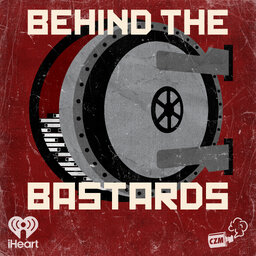Robert is joined by Miles Gray to discuss Clarence Thomas, a four part series.
In 1 playlist(s)
Behind the Bastards
There’s a reason the History Channel has produced hundreds of documentaries about Hitler but only a …Social links
Follow podcast
Recent clips

Part Four: How Jeffrey Epstein Helped Build the Modern World
1:10:16

Part Three: How Jeffrey Epstein Helped Build the Modern World
1:06:22

Part Two: How Jeffrey Epstein Helped Build the Modern World
1:02:28
 Behind the Bastards
Behind the Bastards